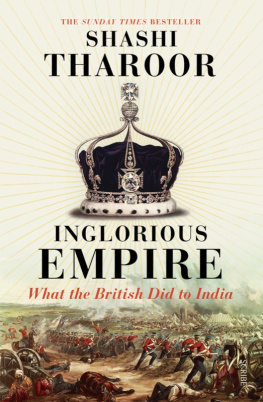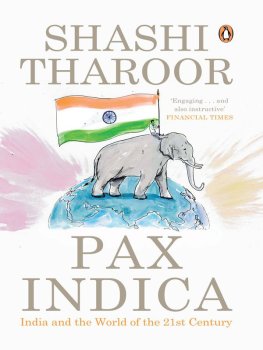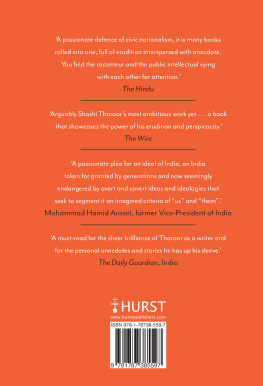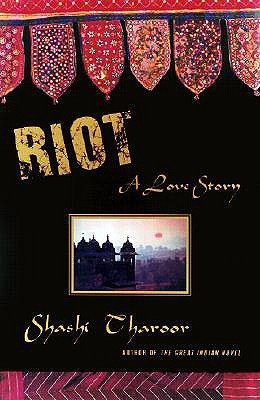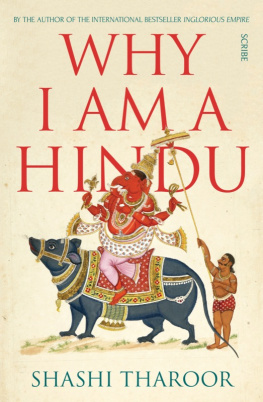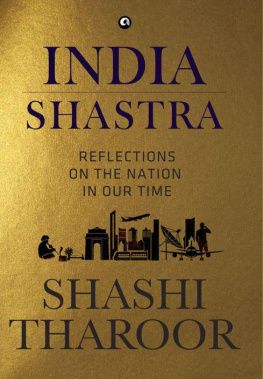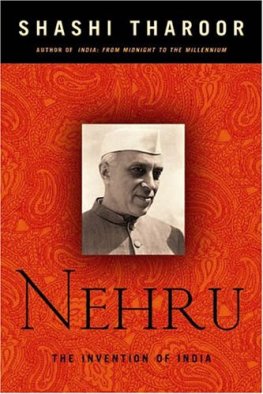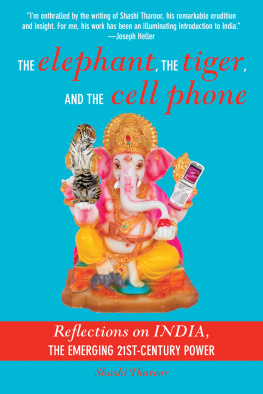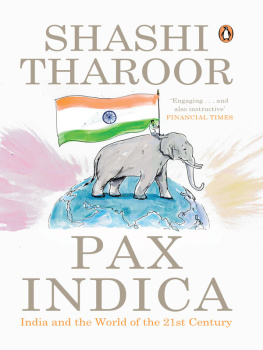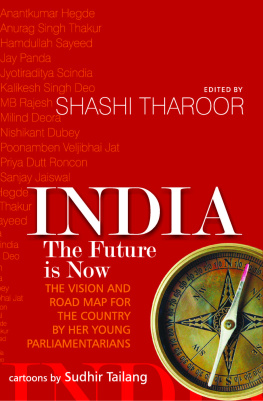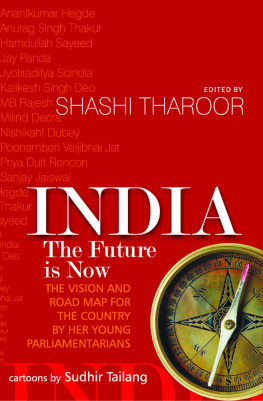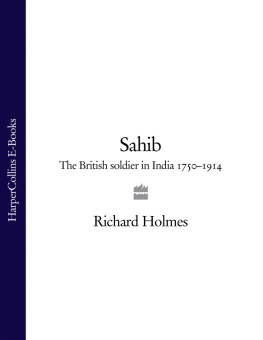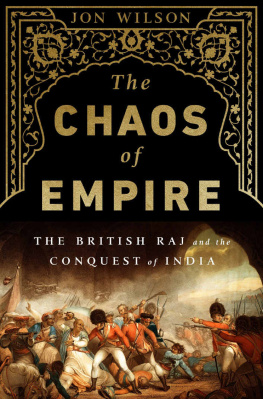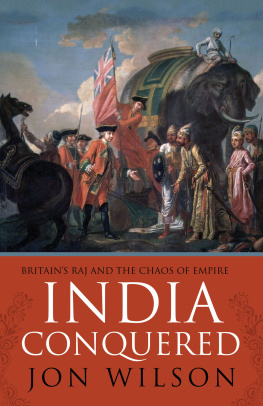
Inglorious Empire
Shashi Tharoor served for twenty-nine years at the UN, culminating as Under-Secretary General. He is a Congress MP in India, the author of fourteen previous books and has won numerous literary awards, including a Commonwealth Writers Prize. Tharoor has a PhD from the Fletcher School and was named by the World Economic Forum in Davos in 1998 as a Global Leader of Tomorrow.
For my sons, Ishaan and Kanishk,
whose love of history equals,
and knowledge of it exceeds,
my own
Scribe Publications
1820 Edward St, Brunswick, Victoria 3056, Australia
2 John St, Clerkenwell, London, WC1N 2ES, United Kingdom
First Published under the title An Era of Darkness: the British Empire in India by Aleph Book Company, New Delhi, India in 2016
Published by arrangement with C. Hurst & Co. (Publishers) Ltd., 41 Great Russell Street, London
Published by Scribe 2017
Copyright Shashi Th aroor 2016
All rights reserved. Without limiting the rights under copyright reserved above, no part of this publication may be reproduced, stored in or introduced into a retrieval system, or transmitted, in any form or by any means (electronic, mechanical, photocopying, recording or otherwise) without the prior written permission of the publishers of this book.
Th e moral right of the author has been asserted.
9781925322576 (Australian edition)
9781925548518 (e-book)
A CiP entry for this title is available from the National Library of Australia.
scribepublications.com.au
scribepublications.co.uk
But tis strange.
And oftentimes, to win us to our harm,
The instruments of darkness tell us truths
William Shakespeare, Macbeth , Act I, scene iii
Thy hand, great Anarch! lets the curtain fall;
And universal darkness buries all.
Alexander Pope, The Dunciad
We live in the flickermay it last as long as the old earth keeps rolling!
But darkness was here yesterday.
Joseph Conrad, Heart of Darkness
Indiaa hundred Indiaswhispered outside beneath the indifferent moon, but for the time India seemed one and their own,
and they regained their departed greatness by hearing its departure lamented
E. M. Forster, A Passage to India
CONTENTS
CHRONOLOGY
1600 | British Royal Charter forms the East India Company, beginning the process that will lead to the subjugation of India under British rule. |
161314 | British East India Company sets up a factory in Masulipatnam and a trading post at Surat under William Hawkins. Sir Thomas Roe presents his credentials as ambassador of King James I to the Mughal Emperor Jehangir. |
161518 | Mughals grant Britain the right to trade and establish factories. |
1700 | India, under Mughal Emperor Aurangzeb, accounts for 27 per cent of the world economy. |
1702 | Thomas Pitt, Governor of Madras, acquires the Pitt Diamond, later sold to the Regent of France, the Duc dOrlans, for 135,000. |
1739 | Sacking of Delhi by the Persian Nadir Shah and the loot of all its treasures. |
1751 | Robert Clive (172574), aged twenty-six, seizes Arcot in modern-day Tamil Nadu as French and British fight for control of South India. |
1757 | British under Clive defeat Nawab Siraj-ud-Daula to become rulers of Bengal, the richest province of India. |
1765 | Weakened Mughal Emperor Shah Alam II issues a diwani that replaces his own revenue officials in the provinces of Bengal, Bihar and Orissa with the East India Companys. |
1767 | First Anglo-Mysore War begins, in which Hyder Ali of Mysore defeats the combined armies of the East India Company, the Marathas and the Nizam of Hyderabad. |
1771 | Marathas recapture Delhi. |
1772 | Birth of Rammohan Roy (d. 1833). British establish their capital in Calcutta. |
1773 | British East India Company obtains monopoly on the production and sale of opium in Bengal. Lord Norths Regulating Act passed in Parliament. Warren Hastings appointed as first Governor-General of India. |
1781 | Hyder Alis son, Tipu Sultan, defeats British forces. |
1784 | Pitt the Younger passes the India Act to bring the East India Company under Parliaments control. Judge and linguist Sir William Jones founds Calcuttas Royal Asiatic Society. |
178795 | British Parliament impeaches Warren Hastings, Governor-General of Bengal (177485), for misconduct. |
1793 | British under Lord Cornwallis introduce the permanent settlement of the land revenue system. |
1799 | Tipu Sultan is killed in battle against 5,000 British soldiers who storm and raze his capital, Srirangapatna (Seringapatam). |
1803 | Second Anglo-Maratha War results in British capture of Delhi and control of large parts of India. |
1806 | Vellore mutiny ruthlessly suppressed. |
1825 | First massive migration of Indian workers from Madras to Reunion and Mauritius. |
1828 | Rammohan Roy founds Adi Brahmo Samaj in Calcutta, first movement to initiate socio-religious reform. Influenced by Islam and Christianity, he denounces polytheism, idol worship and more. |
1835 | Macaulays Minute furthers Western education in India. English is made official government and court language. |
1835 | Mauritius receives 19,000 migrant indentured labourers from India. Workers continued to be shipped to Mauritius till 1922. |
1837 | Kali-worshipping thugs suppressed by the British. |
1839 | Preacher William Howitt attacks British rule in India. |
1843 | British conquer Sindh (present-day Pakistan). British promulgate doctrine of lapse, under which a state is taken over by the British whenever a ruler dies without an heir. |
1853 | First railway built between Bombay and Thane. |
1857 | First major Indian revolt, called the Sepoy Mutiny or Great Indian Mutiny by the British, ends in a few months with the fall of Delhi and Lucknow. |
1858 | Queen Victorias Proclamation taking over in the name of the Crown the governance of India from the East India Company. Civil service jobs in India are opened to Indians. |
1858 | India completes first 200 miles of railway track. |
1860 | SS Truro and SS Belvedere dock in Durban, South Africa, carrying first indentured servants (from Madras and Calcutta) to work in sugar plantations. |
1861 | Rabindranath Tagore is born (d. 1941). |
1863 | Swami Vivekananda is born (d. 1902). |
1866 | At least a million and a half Indians die in the Orissa Famine. |
18691948 | Lifetime of Mohandas Karamchand Gandhi, Indian nationalist and political activist who develops the strategy of non-violent disobedience that forces Britain to grant independence to India (1947). |
Next page
